 The following originally appeared on Alternet.
The following originally appeared on Alternet.
—
Our environmental laws and regulations, rather than put in place protections for the environment, instead seem to be written to exploit it. Here’s what can we do about it.
The following is excerpted from the recently released book, The Rights of Nature: The Case for a Universal Declaration on the Rights of Mother Earth, produced by the Council of Canadians, Global Exchange and Fundacion Pachamama. This book reveals the path of a movement driving transformation of our human relationship with nature away from domination and towards balance. This book gathers the wisdom of indigenous cultures, scientists, activists small farmers, spiritual leaders and US communities who seek a different path for protecting nature by establishing Nature’s Rights in law and culture. In addition to this excerpt, the book includes essays from Vandana Shiva, Desmond Tutu, Thomas Goldtooth, Eduardo Galeano, Maude Barlow and many others.
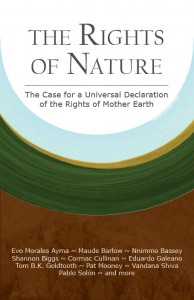 Two ways to order your copy of the book:
Two ways to order your copy of the book:
1) Contact Kylie Nealis – kylie@globalexchange.org. The book price is $15 including shipping within the US. (For international orders email Kylie Nealis for shipping price) or…
2) Donate $50 or more to the Community Rights campaign, and receive your own signed copy of the book.
Excerpts from Rights of Nature: The Case for a Universal Declaration on the Rights of Mother Earth:
It takes thousands of years for individual drops of rain to maneuver through silent passages and gently accumulate into underground aquifers. Purified and enriched over the millennia by mineral deposits deep in the earth, groundwater is the sacred lifeblood of local watersheds upon which all life — including human communities — depend. Yet it takes no time at all to destroy this delicate balance. In fact, all it takes is a simple piece of paper.
Steeped in colonial history, Nottingham, New Hampshire, could be a picture postcard of quaint village life in New England. Yet in 2001, this tiny rural village of 4,000 residents became the poster child for too familiar “site-fights” between small towns seeking to protect local water and large multinational corporations seeking to extract it. It was then that the USA Springs Corporation applied to the state for a permit to extract more than 400,000 gallons of water a day from Nottingham’s local aquifer to bottle and sell overseas.
Corporate water withdrawals — siphoning off hundreds of thousands of gallons a day from local aquifers — impact both surface and groundwater resources. They deplete drinking water and can contaminate aquifers and wells. In addition, withdrawals dry up streams, wetlands, and rivers, as well as reduce lake levels, damaging habitat and harming wildlife.
For seven years the community of Nottingham came together to stop their water from being mined. Upon discovering that our own laws forbid communities from saying “no” to the wide array of dirty, destructive and unwanted practices allowed by law, they attempted to protect their local groundwater using all the tools available under the law. They did everything “right” by traditional, conventional environmental activism. They lobbied their state legislature, petitioned their government, testified at hearings, protested, rallied, educated and organized their neighbors and filed lawsuits. But as is so often the case, it just wasn’t enough.
When the people of Nottingham beseeched their state environmental agency, the New Hampshire Department of Environmental Services, to take effective action and protect the aquifer, their requests went unmet. Instead of helping them protect their water, the agency was in fact responsible for issuing permits to the corporation to take it.
Is the system broken or working perfectly?
The experience of Nottingham is shared by thousands of communities across the United States and around the world that discover that their government officials and agencies — ostensibly in place to protect them — are, in practice, serving other interests.
The question that the people of Nottingham were forced to ask is, “why?” Why are corporations allowed to override community concerns and put destructive projects in our midst? Why do our environmental laws and regulations, rather than put in place protections for the environment, instead seem to be written to exploit it? And why is our government helping a corporation to extract water from a community and sell it for profit, when the impacts from such projects are so significant?
These are the questions that people and communities find themselves asking when they face the threat of water extraction, mining, drilling, or a range of other activities. Based on the assumption that environmental legislation was in earnest set up to protect Nature, much of our environmental activism has logically been spent trying to “fix” what appears broken; seeking to improve the types of laws and regulations that Nottingham ran into.
But what if the system was never designed to put Nature first?
Under New Hampshire’s Groundwater Protection Act — initially lauded as an important legislative tool, corporations are awarded permits by the state to siphon off water from local aquifers. Thus, despite the Act’s title, the law in fact authorizes the exploitation of water within the State of New Hampshire. It is much like the federal Clean Air Act and the Clean Water Act, which govern how much pollution of our air and water can occur.
This is not a mistake or somehow unique, and it is not about corruption within a generally functioning system. Rather, the major environmental laws in the United States, which have now been exported and adopted around the world, are laws not borne of protection, but of exploitation.
Although it’s rarely said out loud, it is often the industry to be regulated that creates the laws we ask our legislators to enforce. And when it becomes too expensive to comply with the regulations, corporations are often exempted from them, or the regulations are simply rewritten. By design our environmental laws place commerce above nature, and in so doing they legalize certain amounts of harm to ecosystems. And by design regulatory agencies administering these laws are in place to operationalize that exploitation.
This isn’t to say we haven’t protected anything while toiling within this system of law. Whatever limits to damage have been achieved have come from dedicated vigilance by the hands of caring and concerned people. But taking a step back to look at the big picture, we must also recognize what has been lost.
By almost every measure, the environment today is in worse shape than when the major U.S. environmental laws were adopted nearly 40 years ago and replicated worldwide. Global species decline is increasing exponentially, global warming is far more accelerated than previously believed, deforestation continues unabated around the world, and overfishing in the world’s oceans are pushing many fisheries to collapse. With so much at stake, the question is — why haven’t we been successful at ending this destruction?
It certainly is not from lack of effort by communities or activists. Rather, the system of law within which their efforts are taking place is based on entirely the wrong premise — that Nature is property.
The Clean Air Act, the Clean Water Act, and similar state laws legalize environmental harms by regulating how much pollution or destruction of Nature can occur. Rather than preventing pollution and environmental destruction, these laws instead codify it. How else could we justify the damming of rivers, the blowing off of mountaintops for coal or fishing to extinction?
We codify our values in law, and thus for time immemorial we have treated nature in law, as well as in culture, as a “thing” — as amoral, without emotion or intelligence, without any connection to or having anything in common with us. In this way we justify and rationalize our exploitation, our destruction, our decimation. It is the long history of humankind’s relationship with Nature as a possession, rather than as a system governing our own well-being.
So when the people of Nottingham asked state agencies for help that was not forthcoming, the lack of assistance was not sheer unwillingness; rather the state agency was simply carrying out the law of the land in assisting the corporation to take their water.
The nature of property: Is Nature a slave?
In the United States, title to property carries with it the legal authority to destroy the natural communities (which include human communities and ecosystems) that depend on that property for survival. In fact, our environmental laws were passed under the authority of the Commerce Clause of the U.S. Constitution, which grants exclusive authority over “interstate commerce” to Congress. The migration of birds, rivers flowing to the sea, or almost any natural process you can name is, or can be classified as interstate commerce. Treating Nature as commerce has meant that all existing U.S. environmental law frameworks are anchored in the concept of Nature as property.
But history shows that with enough will, unjust laws that deny rights can change. Slaves and women were once considered property, but through massive shifts in law and culture they moved from being “right-less” to being rights-bearing.
During slavery in the United States, the economies of both the North and South were based on slavery. Slaves provided the labor force upon which the new country depended. Slaves were the property of the slave master and a series of “slave codes” were put in place to regulate the treatment of slaves. Slave codes in South Carolina required the whipping of a slave who left his master’s plantation without permission. In Louisiana, any slave who hit his master was to be punished by death. In Alabama, teaching a slave to read was illegal and violators were required to pay a fine.
Many advocates of slavery argued that the slave codes would somehow lead to a gradual end of the slave system; that slaves themselves did not “need” legal rights in order to be sufficiently protected. It is easy from today’s vantage point to see that this regulatory framework did not and could never protect the slaves or end slavery. To the contrary, it codified, enforced and upheld the system of property and the continued enslavement of human beings. Today in the United States and in much of the world, Nature is treated in the same way, and laws and regulations have been put in place to regulate ecosystems as property.
What does it mean to recognize the Rights of Nature?
If we believe that rights are inherent, then Nature’s rights already exist, and any law that denies those fundamental rights is illegitimate.
Under existing environmental laws, a person needs to prove “standing” in order to go to court to protect Nature. This means demonstrating personal harm from logging, the pollution of a river, or the extraction of water. Damages are then awarded to that person, not to the ecosystem that’s been destroyed. Women were once considered the property of their husbands or fathers, and as such had no legal standing. Prior to the 19th Amendment, if a married woman was raped, it was considered a property crime and damages were awarded to her husband. In the wake of the BP oil spill, the only damage deemed compensable by the legal system is the financial damage caused to those who can’t use the Gulf ecosystem anymore.
Communities in the United States are turning their backs on a system that cannot provide true environmental protection. They are beginning to craft and adopt new laws that recognize that natural communities and ecosystems possess an inalienable and fundamental right to exist and flourish. Residents of those natural communities, as stewards of the place where they live, possess the legal authority to enforce those rights on behalf of those ecosystems. In addition, these laws require local governments to remedy violations of those ecosystem rights.
Under a rights-based system of law, a river has the right to flow, fish and other species in a river have the right to regenerate and evolve, and the flora and fauna that depend on a river have the right to thrive. It is the natural ecological balance of that habitat that is protected. Just as the lion hunts the antelope as part of the natural cycle of life, recognizing Rights of Nature does not put an end to fishing or other human activities. Rather, it places them in the context of a healthy relationship where our actions do not threaten the balance of the system upon which we depend.
In essence, these laws represent fundamental changes to the status of property in the United States. While not eliminating property ownership, they do eliminate the authority of a property owner to destroy entire ecosystems that exist and depend on that property. These laws do not stop development; rather they stop the kind of development that interferes with the existence and vitality of those ecosystems.
This represents a true paradigm shift, one that recognizes that we can no longer tinker at the margins of a legal system that places property at the apex of civilization. It makes no apologies for recognizing that a linear system of development cannot be sustained on a finite planet and that we enslave Nature to our own demise.
Building a movement for the Rights of Nature
Environmental and community rights attorney Thomas Linzey has been known to say that, “There has never existed a true environmental movement in this country” because movements drive rights into fundamental structures of law, which environmentalists have never sought to do. It’s a provocative statement sure to raise the ire of many an advocate for Nature.
On September 19, 2006, the Tamaqua Borough Council in Schuylkill County, Pennsylvania, became the first municipal government in the United States to recognize legally enforceable Rights of Nature. Working with the Community Environmental Legal Defense Fund, they drafted and adopted a local ordinance recognizing that natural communities and ecosystems have a legal right to exist and flourish, that individuals within the community have the authority to defend and enforce the rights of those natural communities and ecosystems, and that the Borough government has a legal duty to enforce the ordinance.
Over a dozen more communities in Pennsylvania, New Hampshire, Maine, and Virginia have now adopted ordinances recognizing legally enforceable Rights of Nature. Communities in California, New Mexico and elsewhere are in the process of adopting similar laws. The people of Nottingham adopted an ordinance in 2008 that recognizes the inalienable Rights of Nature and bans corporate water extraction.
That same year Ecuador became the first country in the world to recognize the Rights of Nature in its constitution; after generations of watching its fragile ecosystems destroyed by corporate mining, drilling and other practices. The new constitution was approved by an overwhelming margin through a national referendum on September 28, 2008. With that vote, Ecuador became the first country in the world to codify a new system of environmental protection based on rights, leading the way for countries around the world to make this necessary and fundamental change in how we protect Nature. The constitution reads, “Nature or Pachamama, where life is reproduced and exists, has the right to exist, persist, maintain itself and regenerate its own vital cycles, structure, functions and its evolutionary processes.”
In 2009, international leaders that gathered in Copenhagen for the UN Climate Change Conference predictably failed to reach an agreement to save humanity from its own destruction. In response, the World People’s Summit on Climate Change and the Rights of Mother Earth convened in Cochabamba, Bolivia. Some 32,000 people from around the world attended and, led by indigenous communities of Latin America, proposed the Universal Declaration of the Rights of Mother Earth.
This work is now expanding as people and communities and governments conclude that we have pushed the Earth’s ecosystems to the brink and that our existing frameworks of environmental laws are not only inadequate to reverse this destruction, but were never intended to do so.
In September 2010, an international gathering was held in Tamate, Ecuador, to develop a strategy for building an international movement on Rights of Nature. The gathering brought together individuals and organizations from South Africa, Australia, Bolivia, Peru, Ecuador, and the United States. The outcome of the meetings was the formation of the Global Alliance for the Rights of Nature. Key areas of work will be education and outreach, as well as assisting local, state, and national governments around the world to put Rights of Nature laws in place and to build and support a global movement for the Rights of Nature.
A new cultural context for Nature supported by law
How different would our world look if the Amazon could sue oil companies for damages, or if those responsible for the oil spill could be forced to make the Gulf of Mexico “whole”? What if communities could be empowered to act as stewards for their local environments and say “no” to massive groundwater extraction?
As a species we have come to value “endless amounts of more” to our own detriment, and we have codified that value into law. Of course it is up to us to begin the process of deprogramming our society and dispelling our arrogant belief that the Earth “belongs” to humans. Like all successful movements for rights, the cultural change necessary needs only be enough to change the law ¬- the law itself forces the larger cultural change that must take place. However, both are needed in order to truly recognize rights for the right-less.
In 1973, Professor Christopher Stone penned his famous law review article, “Should Trees Have Standing?”. He wrote, “The fact is, that each time there is a movement to confer rights onto some new ‘entity’ the proposal is bound to sound odd or frightening or laughable. This is partly because until the right-less thing receives its rights, we cannot see it as anything but a thing for the use of ‘us’ — us being, of course, those of us who hold rights.”
This is the challenge that every rights-based movement comes up against — not only an illegitimate structure of law that defines a living being as property, but also the culture which is built upon this concept.
The Abolitionists faced this — with slavery not only providing the labor force in the South, but being the driving engine of the economy of the North. Abolishing slavery meant abolishing a way of life. Most said it could not and must never be done. That is the argument we hear and face now. But it can, and we must.
—
Shannon Biggs directs Global Exchange’s Community Rights Program, working to place citizen and Nature’s legal rights above corporate interests. She is the author of Building the Green Economy: Success Stories from the Grassroots (PoliPoint Press, 2007), a former senior staffer at the International Forum on Globalization and a lecturer of International Relations at San Francisco State University.
Mari Margil is the Associate Director of the U.S.-based Community Environmental Legal Defense Fund where she conducts campaign and organizational strategy, media and public outreach and leads the organization’s fundraising efforts. She is a co-author of the recently published The Public Health or the Bottom Line (Oxford University Press, 2010).

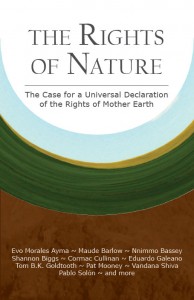
 NOW, IT’S TIME FOR YOU TO TAKE ACTION
NOW, IT’S TIME FOR YOU TO TAKE ACTION Dalit Baum, Ph.D., is the founder of “Who Profits from the Occupation”, an activist research initiative of the
Dalit Baum, Ph.D., is the founder of “Who Profits from the Occupation”, an activist research initiative of the 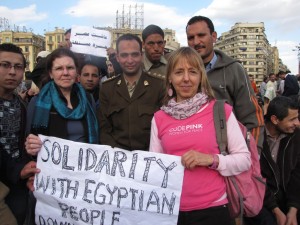 Egyptian protesters have poured into the streets this week calling for President Hosni Mubarak to step down by Friday, the people’s deadline. Global Exchange stands in solidarity with the people of Egypt, and we’re calling on the US Government to support the peaceful and immediate end to the Mubarak regime.
Egyptian protesters have poured into the streets this week calling for President Hosni Mubarak to step down by Friday, the people’s deadline. Global Exchange stands in solidarity with the people of Egypt, and we’re calling on the US Government to support the peaceful and immediate end to the Mubarak regime.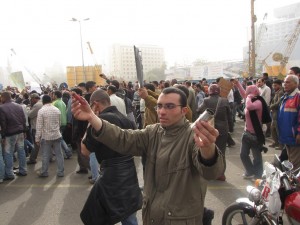 Medea has been emailing updates when she can. Since her earlier post
Medea has been emailing updates when she can. Since her earlier post 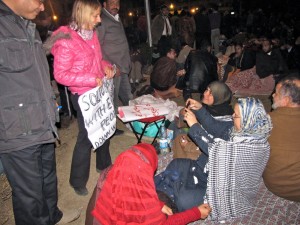 I couldn’t believe that after today’s attacks, there were still women in the square who planned to spend the night. A group of young women ran up to us and started hugging and kissing us. “You don’t know what your presence means to us,” one of the students said. “Please tell Obama that we need him to do more to push Mubarak to go NOW, before more of us get killed.”
I couldn’t believe that after today’s attacks, there were still women in the square who planned to spend the night. A group of young women ran up to us and started hugging and kissing us. “You don’t know what your presence means to us,” one of the students said. “Please tell Obama that we need him to do more to push Mubarak to go NOW, before more of us get killed.”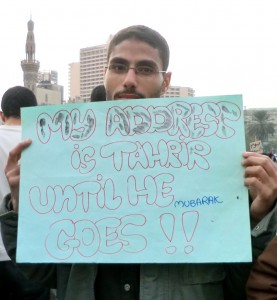 From Medea’s press release today:
From Medea’s press release today: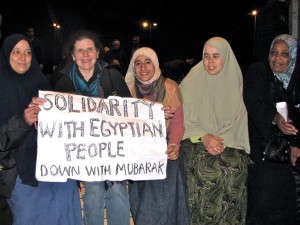 The Time is Now to Show Your Support!
The Time is Now to Show Your Support!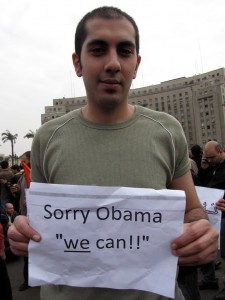 Here are ways you can stand in solidarity with the Egyptian people
Here are ways you can stand in solidarity with the Egyptian people enjamin is cofounder of CODEPINK and Global Exchange. She can be reached for interviews in Cairo at (20) 107148431.
enjamin is cofounder of CODEPINK and Global Exchange. She can be reached for interviews in Cairo at (20) 107148431.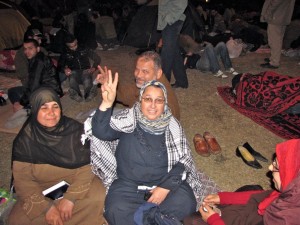 The main square in Cairo—Tahrir Square—is the headquarters of the revolution. Hundreds of thousands of people clogged the square today, and thousands have been camping out all week and insist they will stay until Mubarak leaves. They are young and old, mostly men but a surprising number of women and children. They are professionals and farmers, well off and poor, urban and rural, PhDs and barely literate. Some are long-time political activists who have been jailed by the regime; most have never engaged in anything political.
The main square in Cairo—Tahrir Square—is the headquarters of the revolution. Hundreds of thousands of people clogged the square today, and thousands have been camping out all week and insist they will stay until Mubarak leaves. They are young and old, mostly men but a surprising number of women and children. They are professionals and farmers, well off and poor, urban and rural, PhDs and barely literate. Some are long-time political activists who have been jailed by the regime; most have never engaged in anything political.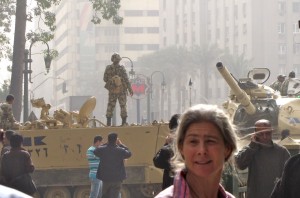 Army tanks line the entrance to the square, but a cordon of civilians separate the army from the protesters. Civilians also set up a 24-hour security detail to check people coming in—men frisk the men to make sure they have no weapons; women inspect the women’s belongings. The young people have organized clean-up crews, collecting garbage, sweeping, holding signs encouraging people to put their trash in the bins. A group of volunteer health workers in white coats walk around taking people’s blood pressure and checking up on their health.
Army tanks line the entrance to the square, but a cordon of civilians separate the army from the protesters. Civilians also set up a 24-hour security detail to check people coming in—men frisk the men to make sure they have no weapons; women inspect the women’s belongings. The young people have organized clean-up crews, collecting garbage, sweeping, holding signs encouraging people to put their trash in the bins. A group of volunteer health workers in white coats walk around taking people’s blood pressure and checking up on their health.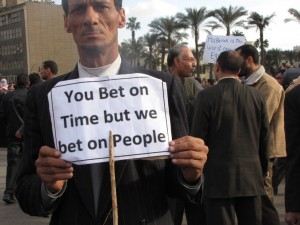 Circles of people gather to recite poetry, play music or sing. Others march round and round chanting “Down with Mubarak, down with Mubarak.” They hold handmade signs with all kinds of slogans. While mostly in Arabic, some signs in English say things like “Christians and Muslims, together against Mubarak” and “USA, Stop supporting Mubarak; We don’t wanna hate the USA.”
Circles of people gather to recite poetry, play music or sing. Others march round and round chanting “Down with Mubarak, down with Mubarak.” They hold handmade signs with all kinds of slogans. While mostly in Arabic, some signs in English say things like “Christians and Muslims, together against Mubarak” and “USA, Stop supporting Mubarak; We don’t wanna hate the USA.”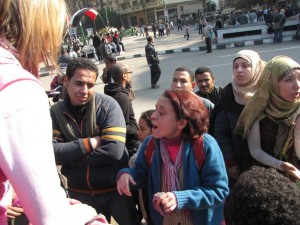 Everywhere, people are engaged in animated political discussions about their nation’s future. Some support Nobel Peace Prize winner Mohammad El Baradei as an interim leader. Others believe he is too far removed from the people, since he has lived abroad for 30 years, and they prefer a collective, interim government to write a new constitution and hold free and fair elections. Religious men with long beards, aligned with the Muslim Brotherhood, argue that Egypt needs a Muslim government; others disagree vehemently, insisting on a secular state. The discussions are passionate, but also friendly and respectful.
Everywhere, people are engaged in animated political discussions about their nation’s future. Some support Nobel Peace Prize winner Mohammad El Baradei as an interim leader. Others believe he is too far removed from the people, since he has lived abroad for 30 years, and they prefer a collective, interim government to write a new constitution and hold free and fair elections. Religious men with long beards, aligned with the Muslim Brotherhood, argue that Egypt needs a Muslim government; others disagree vehemently, insisting on a secular state. The discussions are passionate, but also friendly and respectful.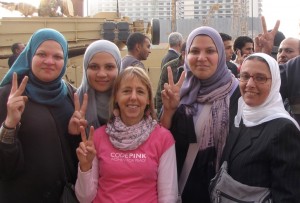 No matter how the situation in Egypt unfolds, a new nation has been born. Ordinary people are doing extraordinary things. They have overcome their fears and regained their dignity. They are writing their own destiny.
No matter how the situation in Egypt unfolds, a new nation has been born. Ordinary people are doing extraordinary things. They have overcome their fears and regained their dignity. They are writing their own destiny.